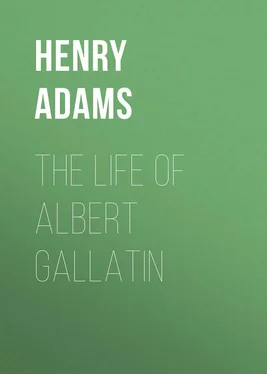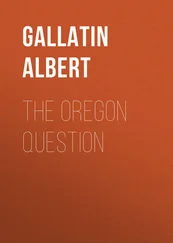Henry Adams - The Life of Albert Gallatin
Здесь есть возможность читать онлайн «Henry Adams - The Life of Albert Gallatin» — ознакомительный отрывок электронной книги совершенно бесплатно, а после прочтения отрывка купить полную версию. В некоторых случаях можно слушать аудио, скачать через торрент в формате fb2 и присутствует краткое содержание. Жанр: foreign_antique, foreign_prose, на английском языке. Описание произведения, (предисловие) а так же отзывы посетителей доступны на портале библиотеки ЛибКат.
- Название:The Life of Albert Gallatin
- Автор:
- Жанр:
- Год:неизвестен
- ISBN:нет данных
- Рейтинг книги:4 / 5. Голосов: 1
-
Избранное:Добавить в избранное
- Отзывы:
-
Ваша оценка:
- 80
- 1
- 2
- 3
- 4
- 5
The Life of Albert Gallatin: краткое содержание, описание и аннотация
Предлагаем к чтению аннотацию, описание, краткое содержание или предисловие (зависит от того, что написал сам автор книги «The Life of Albert Gallatin»). Если вы не нашли необходимую информацию о книге — напишите в комментариях, мы постараемся отыскать её.
The Life of Albert Gallatin — читать онлайн ознакомительный отрывок
Ниже представлен текст книги, разбитый по страницам. Система сохранения места последней прочитанной страницы, позволяет с удобством читать онлайн бесплатно книгу «The Life of Albert Gallatin», без необходимости каждый раз заново искать на чём Вы остановились. Поставьте закладку, и сможете в любой момент перейти на страницу, на которой закончили чтение.
Интервал:
Закладка:
Gallatin was active in procuring the adhesion of the citizens of Fayette, and the address he then drafted for a meeting on September 10 of the township committees of that county is to be found in his printed works. 26There, indeed, the danger was slight, because of all the western counties Fayette had been the least disturbed; yet there, too, numbers were technically at the mercy of the army and the law. Mr. Gallatin was, therefore, of opinion that as the rebellion was completely broken, and the submissions made on the 11th September, if not universal, were so general and had been followed by such prostration among the violent party as to preclude the chance of resistance, a further advance of the army was inadvisable. He drafted a letter on the part of the Fayette townships committee to the governor, on the 17th September, representing this view of the case. 27The President, however, acting on the report of the government commissioners, decided otherwise, and the order for marching was issued on the 25th September.
The news of the riots and disturbances of July had caused prompt action on the part of the general government for the restoration of order, and on the 7th August, President Washington had issued a proclamation calling out the militia of Pennsylvania, New Jersey, Maryland, and Virginia. The 1st September was the time fixed for the insurgents to disperse, and active preparations were made for moving the militia when ordered. Naturally the feeling predominant in the army was one of violent irritation, and, as strict discipline was hardly to be expected in a hastily-raised militia force, there was reason to fear that the western country would suffer more severely from the army than from the rebels. The arrival of the President and of Secretary Hamilton, however, and their persistent efforts to repress this feeling and to maintain strict discipline among the troops, greatly diminished the danger, and the army ultimately completed its march, occupied Pittsburg, and effected a number of arrests without seriously harassing the inhabitants. Nevertheless there was, perhaps inevitably, more or less injustice done to individuals, and, as is usual in such cases, the feeling of the army ran highest against the least offending parties. Mr. Gallatin was one of the most obnoxious, on the ground that he had been a prominent leader of opposition to the excise law and responsible for the violence resulting from that opposition. In this there was nothing surprising; Gallatin was unknown to the great mass of the troops, and the victorious party in politics cannot be expected to do entire justice to its opponents. So far as the President was concerned, no one has ever found the smallest matter to blame in his bearing; the only prominent person connected with the government whose conduct roused any bitterness of feeling was the Secretary of the Treasury. It was asserted, and may be believed, that Mr. Hamilton, who in Pittsburg and other places conducted the examination into the conduct of individuals, showed a marked desire to find evidence incriminating Gallatin. In what official character Mr. Hamilton assumed the duty of examiner, which seems to have properly belonged to the judicial authorities, does not appear; Findley, however, asserts that certain gentlemen, whose names he gives, were strictly examined as witnesses against Gallatin, urged to testify that Gallatin had expressed himself in a treasonable manner at Parkinson’s Ferry, and when they denied having heard such expressions, the Secretary asserted that he had sufficient proofs of them already. 28It is not impossible that Mr. Hamilton really suspected Mr. Gallatin of tampering with the insurgents, and really said that “he was a foreigner, and therefore not to be trusted;” 29it is not impossible that he thought himself in any case called upon to probe the matter to the bottom; and finally, it is not impossible that he foresaw the advantages his party would gain by overthrowing Mr. Gallatin’s popularity. However this may be, the Secretary gave no public expression to his suspicions or his thoughts, and Gallatin was in no way molested or annoyed.
The regular autumnal election took place in Pennsylvania on the 14th October. The army had not then arrived, but there was no longer any idea of resistance or any sign of organization against the enforcement of all the laws. More than a month had passed since order had been restored; even Bradford had submitted, and he and the other most deeply implicated insurgents were now flying for their lives. On the 2d October another meeting of the committee had been held at Parkinson’s Ferry, and unanimously agreed to resolutions affirming the general submission and explaining why the signatures of submission had not been universal; on the day of election itself written assurances of submission were universally signed throughout the country; but the most remarkable proof of the complete triumph of the peace party was found in the elections themselves.
Members of Congress were to be chosen, as well as members of the State Legislature. Mr. Gallatin was, as a matter of course, sent back to his old seat in the Assembly from his own county of Fayette. In the neighboring Congressional district, comprising the counties of Washington and Alleghany and the whole country from Lake Erie to the Virginia line, there was some difficulty and perhaps some misunderstanding in regard to the selection of a candidate. Very suddenly, and without previous consultation, indeed without even his own knowledge, and only about three days before election, Mr. Gallatin’s name was introduced. The result was that he was chosen over Judge Brackenridge, who stood second on the poll, while the candidate of the insurgents, who had received Bradford’s support, was lowest among four. By a curious reverse of fortune Mr. Gallatin suddenly became the representative not of his own county of Fayette, but of that very county of Washington whose citizens, only a few weeks before, had been to all appearance violently hostile to him and to his whole course of action. This spontaneous popular choice was owing to the fact that Mr. Gallatin was considered by friend and foe as the embodiment of the principle of law and order, and, rightly or wrongly, it was believed that to his courage and character the preservation of peace was due. It was one more evidence that the true majority had at last found its tongue.
This restoration of Mr. Gallatin to Congress was by no means pleasing to Mr. Hamilton, who, as already mentioned, on his arrival soon afterwards at Pittsburg expressed himself in strong terms in regard to the choice. From the party point of view it was, in fact, a very undesirable result of the insurrection, but there is no reason to suppose that the people in making it cast away a single thought on the question of party. They chose Mr. Gallatin because he represented order.
The 1st November, 1794, had already arrived before the military movements were quite completed. The army had then reached Fayette, and Mr. Gallatin, after having done all in his power to convince the government that the advance was unnecessary, set off with his wife to New York, and, leaving her with her family, returned to take his seat in the Assembly at Philadelphia. Here again he had to meet a contested election. A petition from citizens of Washington County was presented, averring that they had deemed it impossible to vote, and had not voted, at the late election, owing to the state of the country, and praying that the county be declared to have been in insurrection at the time, and the election void. The debate on this subject lasted till January 9, 1795, when a resolution was adopted to the desired effect. In the course of this debate Mr. Gallatin made the first speech he had yet printed, which will be found in his collected works. 30Like all his writings, it is a plain, concise, clear statement of facts and argument, extremely well done, but not remarkable for rhetorical show, and effective merely because, or so far as, it convinces. He rarely used hard language under any provocation, and this speech, like all his other speeches, is quite free from invective and personality; but, although his method was one of persuasion rather than of compulsion, he always spoke with boldness, and some of the passages in this argument grated harshly on Federalist ears.
Читать дальшеИнтервал:
Закладка:
Похожие книги на «The Life of Albert Gallatin»
Представляем Вашему вниманию похожие книги на «The Life of Albert Gallatin» списком для выбора. Мы отобрали схожую по названию и смыслу литературу в надежде предоставить читателям больше вариантов отыскать новые, интересные, ещё непрочитанные произведения.
Обсуждение, отзывы о книге «The Life of Albert Gallatin» и просто собственные мнения читателей. Оставьте ваши комментарии, напишите, что Вы думаете о произведении, его смысле или главных героях. Укажите что конкретно понравилось, а что нет, и почему Вы так считаете.












